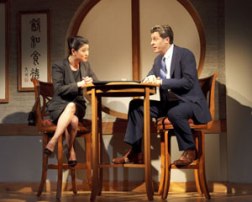Review: Asuncion
Nov 3rd

Jesse Eisenberg certainly hasn’t written an attractive part for himself in his debuting playwriting effort, now being presented by the Rattlestick Playwrights Theater. In his dark comedy Asuncion, the Oscar-nominated star of The Social Network plays Edgar, a journalistic blogger whose reformist ideals are undercut by his clueless political correctness. The sort of spineless twerp who excuses the youths who keep mugging him because of their lower social standing, he also continually debases himself in his strange, sadomasochistic relationship with his roommate Vinny (Justin Bartha).
Vinny, working for a PhD in Black Studies, is a carefree, pot-smoking ne’er do well who likes to hang out in his bathrobe and bang out rhythms on his bongo drums. But he also displays a truly nasty side, particularly towards Vinny, who seems to be in sexual thrall to him.
The two men find their lives uprooted by the arrival of Edgar’s successful older brother Stuart (Remy Auberjonois) and his beautiful new Filipino bride Asuncion (Camille Mana). Stuart asks that the pair babysit Asuncion for a few days while he takes care of some mysterious business. In one of the play’s more contrived plot elements, he apparently feels that the duo’s messy bachelor pad apartment is the perfect hiding place.
Vinny is delighted by the new arrival, but Edgar, hearing that his brother met Asuncion on the Internet, assumes that she is either a sex slave or mail order bride, and determines to interview her for what he feels will be his journalistic breakthrough.
Eisenberg has some interesting ideas to express here about cultural clashes and underlying prejudices, and he also displays a knack for crafting sharply funny one-liners. But he’s less successful in terms of dramatic structure and narrative credibility, with the result that the play never successfully coheres, wandering off in too many disparate directions.
Still, under the breezy direction of Kip Fagan the evening is quite entertaining, with both Eisenberg and Bartha delivering terrifically amusing performances. The latter in particular is a droll delight, investing his portrayal with enough daffy physical humor to suggest that he’s been wasted in the hugely successful Hangover movies. Mana is charming as the fun-loving Asuncion, and Auberjonois is suitably smarmy as the condescending brother.
Cherry Lane Theatre, 38 Commerce St. 212-352-3101. www.Rattlestick.org.
Review: We Live Here
Nov 3rd

I don’t envy actress-turned-emerging-playwright Zoe Kazan; it’s hard to write a family play that steers clear of the usual tropes of long-simmering resentment and buried history. Her second work, We Live Here, arrives at Manhattan Theatre Club’s City Center space in the estimable hands of director Sam Gold, but at the end of the day, Kazan’s plays feels all too familiar, which, yes, breeds contempt.
The play’s contrived premise finds Allie Bateman (Jessica Collins) rushing into a wedding with her painter fiancé Sandy (Jeremy Shamos) a mere six months after first meeting him. (For unexplained reasons, the two have waited to consummate their union). College-age younger sister Dinah (Betty Gilpin, a bundle of jittery nerves here) returns from New York to the New England home of parents Lawrence and Maggie (Mark Blum and Amy Irving) for the wedding. It’s the first time that she will have met Sandy as well as told her parents that she is dating Daniel (Oscar Isaac), a revelation that is a bombshell not just because he is more than a decade Dinah’s senior but because he also dated Annie, Allie’s twin who died when she was a teenager and Dinah a very young girl.
We Live Here’s first act makes for an adroit, if dramatically inert setup, as we wait to see the ripple effect Daniel’s re-entry causes. Gold, who in delicate works like Circle Mirror Transformation and Kin has managed to mine harrowing material out of even the most mundane of circumstances and bring the interior to electrifying life, creates a convincing family portrait. The Bateman’s connections feel real, and even more so, John Lee Beatty’s wonderful set creates the sense of a truly lived-in home rather than a merely polished set. And Kazan has a feel for authentic, thoughtful adult dialogue (We Live Here is the first play in which I have ever seen a character use the word “sanguine” both correctly and appropriately).
But the payoff is ultimately minimal, as Kazan cheapens We Live Here’s rich potential in a second act that offers a useless flashback, turns the character of Daniel into a cliché, and, most of all, offers some condescending armchair psychology on the concept of loss. Instead of sharp observations, the plot detours into lazy convention and an unsubtle ending that even Gold cannot manage to make organic. As a result, the show manages to be both portentous and pretentious.
Collins does admirable work showing how the loss of her twin still reverberates within Allie; it doesn’t take much to provoke her in ways that cause her to lash out at her loved ones. But because she is playing a character significantly younger (and, likely, less self-aware) than herself, Gilpin’s portrayal calls too much attention to itself to feel authentic. Irving, whose hoarse voice is ill-equipped for the City Center stage, is also unable to dig beneath her two-dimensional role to find the grace notes that would humanize the paralyzed ice queen that is Maggie.
Gold gets more solid work from two of the male members of the We Live Here cast, who provide insight into their characters; inner worlds without feeling forced to project them sky high. Shamos makes the sensitive Sandy, whose father abandoned him at a young age, a nice contrast to the unstable Bateman clan. And Blum manages to transform an academic lecture into look at his own mentality. Kazan’s eagerness to turn Daniel into a cipher, however, makes Isaac at a loss to justify much of his character.
In choosing to chart family ties, it would seem that Kazan has unfortunately bound herself too tight.
----- Doug Strassler
Manhattan Theatre Club City Center, 131 W. 55th St., 212-581-1212. www.nycitycenter.org
Review: Chinglish
Oct 28th

Miscommunication—of the linguistic, cultural and relationship kind—is the subject of David Henry Hwang’s Chinglish. Receiving its Broadway premiere after an acclaimed run earlier this year at Chicago’s Goodman Theater, this witty new comedy by the author of M. Butterfly concerns the travails of an American businessman trying to negotiate the labyrinth of Chinese commerce. But with its repetitive gags involving mistranslations, it frequently feels more like an overextended sketch and ultimately lacks the depth to make it more than a slight if entertaining diversion.
Daniel (Gary Wilmes) is a Cleveland entrepreneur who has traveled to the mid-sized city of Guiyang to secure a contract to provide the signage for their new cultural center. Not knowing a word of Chinese, he enlists the service of an Australian émigré interpreter (Stephen Pucci) to help him in his dealings.
At first, his meeting with the minister (Larry Lei Zhang) and his stern female vice-minister, Xi Yan (Jennifer Lim), seems to go well, despite the comic mistranslations of a young translator whose mistakes become evident to the audience via projected supertitles of the actual words being spoken. (Indeed, lengthy portions of the play’s dialogue are in Mandarin, which is surely a first for a Broadway play.)
But complications soon abound, as the English speaking Xi Yan insists on a private meeting with Daniel in which she professes to want to secretly help him for reasons of her own. Daniel quickly falls in love with his unofficial partner, even while their different agendas and inability to fully communicate with each other cause an endless series of problems.
The playwright has a great deal of fun not only with the language barriers separating the various parties, but also their cultural differences. One of the wittier extended gags involves the Chinese bureaucrats’ unexpected reaction to the revelation that Daniel once worked as a salesman for the disgraced company Enron.
But the comic conceits ultimately wear thin, and the ostensible love story between the two principals, culminating in a surprise plot twist, doesn’t have the desired emotional resonance. Not helping matters is the play’s tired structure, with the action consisting of a flashback framed by Daniel’s Powerpoint presentation about conducting business in China.
Although Wilmes is rather bland as the hapless American, he’s certainly convincing enough. The real acting honors go to Lim, superb as the double-dealing Xi Yan, and the supporting players, who fully mine the laughs in the complex dialogue in both English and Chinese. Director Leigh Silverman has provided a fast and breezy production, aided mightily by David Korins’ wonderfully versatile sets and those terrific projections.
Longacre Theatre, 220 W. 48th St. 212-239-6200. www.ChinglishBroadway.com
Review: Relatively Speaking
Oct 21st

Relatively Speaking, the new evening of comic one-acts by Woody Allen, Elaine May and Ethan Coen, has just opened on Broadway, and all I can say is…oy! That this level of writing talent--not to mention an estimable cast of many comedic pros--could produce such a lethargic, laugh-free evening is a mystery and a tremendous disappointment.
Truth be told, none of the authors’ playwriting efforts, at least in recent years, has been particularly good—there’s a good reason that May doesn’t include the Broadway flop Taller Than a Dwarf in her credits. But there were high hopes for this production directed by actor John Turturro.
Coen’s relatively brief curtain-raiser, Talking Cure, is as baffling as it is unfunny. The first scene depicts the charged interaction between a surly mental hospital patient (Danny Hoch)--a postal office worker who went postal on a customer--and a psychiatrist (Jason Kravits). The action then segues to a suburban home in the 1950s, where a long-married couple (Allen Lewis Rickman, Katherine Borowitz), presumably the patient’s parents, is squabbling. None of it makes much of an impression.
May’s seemingly interminable (actually, a little more than 50 minutes) George is Dead marks the welcome return of Marlo Thomas to the Broadway stage. Unfortunately, the actress, who looks stunning at age 73, is trapped in the one-note role of Doreen, a wealthy socialite who has just lost her husband in a skiing accident. Infantile and helpless, she shows up at the apartment of Carla (Lisa Emery), the daughter of the nanny she had as a child. There she makes endless selfish demands on her host, who is in the middle of a vicious argument with her husband (Grant Shaud). It’s a one-joke premise, and the joke isn’t funny at that.
Allen’s contribution demonstrates that the veteran funnyman hasn’t lost his ability to craft amusing one-liners. They flow fast and furiously in Honeymoon Hotel, but the thin sketch feels like a relic, something that definitely wouldn’t have passed muster at Your Show of Shows, where the young Allen worked as a writer. It concerns a middle-aged novelist, Jerry (Steve Guttenberg), who runs off with his son’s nubile bride-to-be (Ari Graynor) on their wedding day, only to be pursued to the tacky titular setting by numerous interested parties. They include Jerry’s furious wife (Caroline Aaron); his best friend (Shaud); the jilted bridegroom (Bill Army); the bride’s parents (Julie Kavner, Mark-Linn Baker); the clueless rabbi (Richard Libertini) and Jerry’s hapless shrink (Kravits). Eventually, a Brooklynese-talking pizza delivery man (Hoch) shows up to impart some working-class wisdom to the self-absorbed group.
Even with some admittedly funny jokes and a dream cast of supporting comic players (where has the great Libertini been all these years?), the piece feels strained and vacuous. And considering Allen’s own controversial romantic issues, it also comes across as more than a little bit tacky.
Not helping matters is the leaden direction by Turturro, who based on this evidence doesn’t seem to have a comic bone in his body. Although to be fair, not even a Mike Nichols or Gene Saks would have been able to bring anything to these futile exercises.
Brooks Atkinson Theatre, 256 W. 47th St. 877-250-2929. www.ticketmaster.com.
Review: The Agony and the Ecstasy of Steve Jobs
Oct 18th

The recent death of Steve Jobs provides a fascinating conundrum for Mike Daisey, the writer/performer of the solo piece The Agony and the Ecstasy of Steve Jobs. On the one hand, it provides an added level of discomfort, since the monologue is not exactly complimentary to its subject. On the other, it makes the show feels breathtakingly refreshing in the light of the pervasive hagiography that has occurred in recent weeks.
By now, Daisey has proven himself to be a master monologist and a worthy successor to the late, great Spalding Gray. Although all of his pieces have a highly personal aspect, he’s far less self-reflective than his predecessor, and this latest effort demonstrates yet again his talent for delivering incisive explorations of serious political and social themes while at the same being consistently hilarious.
In this two-hour presentation, he interweaves an account of Jobs’ life and career as one of the most influential figures in modern business and technology with a hard-hitting expose of the horrific conditions under which Apple’s—and most other company’s--high-tech products are made.
Labeling himself as an “Apple aficionado” who has long been a “worshipper at the cult of Mac,” Daisey delivers a compelling biographical portrait of Jobs in which he describes him as both “a visionary and an asshole.”
But it’s his description of a trip taken to Shenzhen, China--where there are massive factories in which Apple’s devices are manufactured--that is the evening’s most compelling element. Posing as a wealthy businessman, he managed to get a tour of one such mega-factory, Foxxconn. To give an idea of its scale, he challenges the audience to imagine a cafeteria that can accommodate 10,000 workers, and then take in the fact that the factory contains fifty such cafeterias.
He movingly relates his secret interviews with workers who are just twelve and thirteen years old and another whose hands have been reduced to virtual claws as a result of the repetitive movements his job required. He showed the latter his iPad, which the man had never seen in operation despite the fact that he had been assembling them for months.
Although Daisey’s message is deadly serious, the piece never turns ponderous, thanks to his masterful comic technique. Whether describing the horrors of Powerpoint presentations, imitating the ungodly screech of a dot matrix printer, or relating his own obsession with Apple products, he provides belly laughs that make the evening as entertaining as it is thoughtful.
Public Theater, 425 Lafayette St. 212-967-7555. www.publictheater.org.